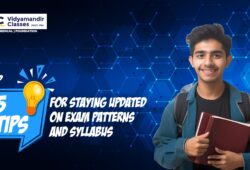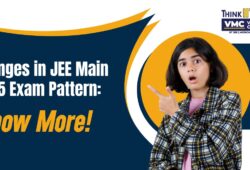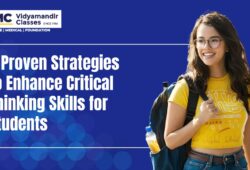VMC Vision: Solution to your confusion
 Posted On
Posted On
759 total views, 2 views today
“It is the set of the sails, not the direction of the wind that determines which way we will go.”
– Jim Rohn
Vidyamandir Classes has always relished the privilege of meeting the needs of the students through imparting quality education. Always the one to set a benchmark for others to follow, VMC Vision is the first of the firsts Career Selector Test, to be introduced for the school children by any prep-test category players.
Owing to its sincere endeavour of ensuring knowledge and guidance while helping students in the momentous decisions of their lives, the best of the best career selector test, VMC Vision is meant for students of class 11th & 12th with a view to make the approach of career selection smooth and clear.
The purpose of VMC Vision is to be the guiding light in students’ life, further enabling them to uncover their strengths and hidden talents in order to rule the world they are best suited for. People often combat with career related issues later in life. The utter confusion, denial, lack of satisfaction, insecurity are some of the many things that are fused with a career one finds tough settling in. Years of rich expertise in education sector and understanding the dreams of the students within a close proximity, we’ve come up with VMC Vision- a quick, holistic test which is that shining light at the end of the tunnel that could help students make the right decision early and in line with their interests and choices so that they can live a happy, successful and moreover, a contented life.
Apart from being a key motivator in laying the strong fundamentals for students’ career ahead, VMC Vision has a distinct way of breathing air into students’ veiled desires.
The tests are separated into various parameters which are further divided into total 20 sub-parameters for a better and an in-depth information about all that can be known. The parameters on which students can uncover their skills and potentials are:
- Orientation Style: Orientation style identifies what an individual is driven by. Understanding the orientation style will help you with career decision based on your dominant style of interaction with the surroundings.
- Creative: Creativity is marked by the ability to use the imagination or original ideas to create something.
- People: People orientation implies that you’d rather not keep your head down and work in isolation. You prefer engaging directly with people in your day-to-day life.
- Administrative: It involves helping to organise and supervise the way that an organization or an institution works.
- Informative: It is an ability to provide or convey information.
- Interest: Understanding your Interest will help you identify what work areas excite you and helps you identify career options which are personally rewarding. Interest assessment explores your interest across multiple career options to find the right match which shall keep you engaged.
- Marketing: Refers to activities a company undertakes to promote the buying or selling of a product or service.
- Governance & Administration: Administration is concerned with the implementation of the products of governance. While governance institutions frame laws and policies, it is the administrative institution that implements them.
- Media & Communication: Refer to the ways, means or channels of transmitting message from sender to the receiver.
- Science & Maths: Deals with the logic of shape, quantity and arrangement.
- Health: Focuses on the individual or community to make informed decisions about health/ disease issues.
- Medicine & Fitness: Deals with physical fitness and the treatment and prevention of injuries related to sports and exercise.
- Engineering: Orbits around science and technology concerned with the design, building, and use of engines, machines, and structures.
- Information & Technology: Revolves around technical theory, networking, programming, and computer hardware.
- Entrepreneurship: Ability and eagerness to develop, organize and run a business enterprise, along with any of its uncertainties in order to make a profit.
- Actuarial Sciences: Discipline that applies mathematical and statistical methods to assess risk in insurance, finance, and other industries and professions. More generally, actuaries apply rigorous mathematics to model matters of uncertainty.
- Legal: A human science which furnishes beyond techniques, skills and competences the basic philosophies, ideologies, evaluations and instrumentations all addressed to the creation and maintenance of a just society.
- Hospitality: Revolves around learning a range of culinary skills and have the opportunity to take an active role in serving food and drink.
- Finance & Accounting: The technical skills associated with many of the procedures of finance analysis and accounting standards.
- Education Training & Social Services: Imparts knowledge and training related to the upliftment of the marginalized in areas such as education, sanitation, and their welfare.
- Commerce & Management: Commerce refers to the exchange of goods, services or something of value, between businesses or entities. Management is the organization and coordination of the activities of a business in order to achieve defined objectives.
- Defence Services: The organization of a country’s armies and weapons, and their use to protect the country or its interests.
- Applied Arts: A broad subject area that combines aesthetics, design, consumer need, and finding practical solutions to problems.
- Design: Encompasses the study of both the internal practices of design and the external effects that design activity has on society, culture and the environment.
- Social Sciences & Humanities: Both Humanities and Social Science study human beings, our cultures, and societies.
- Performing Arts: Refer to the forms of art where an artist uses his own face, body and presence.
- Personality: Understanding your Personality will help you identify your consistent behavior patterns. Every individual is different due to their unique blend of attributes. Personality assessment identifies what career options suit your style and match your personal attributes.
- Extraversion: Extraversion is the ability to talk easily to others, assert viewpoints and prefer working in groups, rather than working alone.
- Moral Conformity: Moral conformity implies standing by your principles & code of conduct rather than matching attitudes, beliefs, and behaviors to group norms so as to fit into the group.
- Organizational Skills: Organization skill is the ability and style of an individual to structure plan and meet their goals in a systematic manner.
- Enterprising: Enterprising is being assertive, confident, high on risk- taking capacity, and having the ability to persuade others.
- Enthusiasm: Synonymous with vitality, spiritedness & vigor, enthusiasm is having abundant or intense energy and curiosity to gather knowledge.
- Team Work: Team work implies including not only your views but also the views of others while working towards a common goal. It involves working collaboratively with people and maximizing the team output.
- Practical: Synonymous with pragmatic, real & hands-on; practical is being more concerned with practice than theory.
- Resilience: Resilience is the ability to pursue chosen path despite stress, high- risk status, challenges and hardships.
- Aptitude: Understanding your Aptitude will help you explore your innate strengths. Every individual has a unique area of expertise and their own forte. Aptitude assessment predicts what is your innate ability and potential and helps you find career options that are in sync with your aptitude.
- Mechanical: Ability to grasp and use mechanical concepts and principles to so solve problems.
- Verbal: Ability to comprehend words and sentences and deduce meaningful relationship from them.
- Info Tech: Ability to grasp and use principles and concepts of technology and computer programs to solve problems.
- Spatial: Ability to manipulate shapes in two dimensions or to visualize three-dimensional objects presented as two-dimensional pictures.
- Logical Reasoning: Ability to identify and isolate components of an argument to arrive at a complete inference and reach a conclusion.
- Emotional Quotient: Understanding your Emotional Intelligence will help you understand your effectiveness in social situations. Emotional Intelligence assessment identifies how well do you recognize and handle your own emotions and interpersonal relationships.
- Empathy: Perceiving and being aware about emotions of others, including being sensitive to a diverse population.
- Pro Social Behavior: Having the motivation to help others without any personal gain.
- Motivation: Having achievement drive, optimism, and being committed to one’s values, needs and goals.
- Emotional Self Awareness: Being aware of and recognize one’s own emotions.
The test comes with 30-page detailed stream/career report with scoring on each of the 4 or 6 parameters and additional 73 sub parameters which will further help students in outlining their skills and talents while directing them towards their dreams, in line with their interests. Moreover, test highlights the Individual Improvement Plan (IIP) which is unique and special for each individual student and will thereby help them in identifying the right way ahead while making a significant mark in the stream of their deserved ability.



